

Big Family: The Advantages and Disadvantages of Big Families
In today’s post, we’re talking all about big families: the advantages and disadvantages of having a big family, and your big family questions answered!
It’s no secret that big families come with their own set of unique joys and challenges.
Whether you’re a parent of one or ten, it can be tough to keep track of everything in your big family. From coordinating schedules to finding enough space for everyone, there are plenty of challenges in a big family.
Luckily, there are also plenty of joys to go around.
From the shared laughter around the dinner table to the sense of security and support that comes from knowing you’re never alone, there are plenty of reasons to love a big family.
Today, we’ll take a detailed look at the lives of big families and things to consider as well as the unique challenges they face.
If you want to understand what the life of big families feels like, read on to know more!
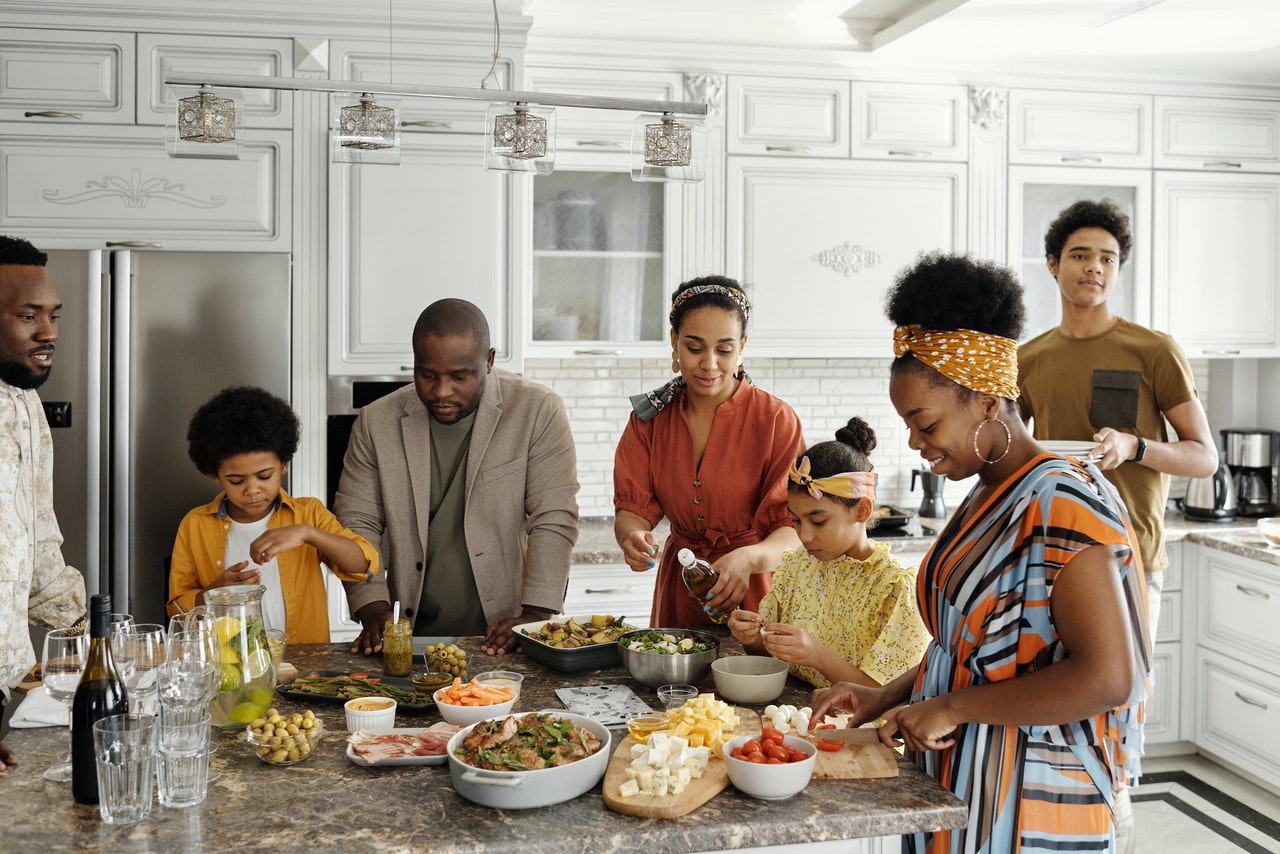
Table of Contents
How Many is a Big Family?
Usually, a family with more than three children is considered a “big family.”
In some cases, it may also refer to a family with multiple generations living under one roof.
Whatever the definition, a big family typically requires more space, more resources, and more patience than a smaller one. But they also tend to be louder, messier, and more chaotic.
There are also more chances for conflict, but also more chances for love and laughter. In many ways, a big family is like a microcosm of the world.
It can be difficult to manage, but it’s also full of potential.
Which is correct: big family or large family?
Technically speaking, big often refers to the physical size of an object, such as a big house, or big television. Big can also refer to something that is weighty and important (milestone moments in life are often considered “big” moments).
Large usually only refers to the physical size of something and is often used less often than “big”. Both terms are used interchangeably for the most part.
This being said, you can call a family a “big family” or a “large family” without being wrong.
What’s It Like Having a Big Family?
As someone who comes from a large family (I’m the oldest of four siblings), I can tell you that there are many advantages to a big family!
Of course, just like everything, there are some possible disadvantages, too. Let’s talk through a few of the main advantages and disadvantages of a big family…
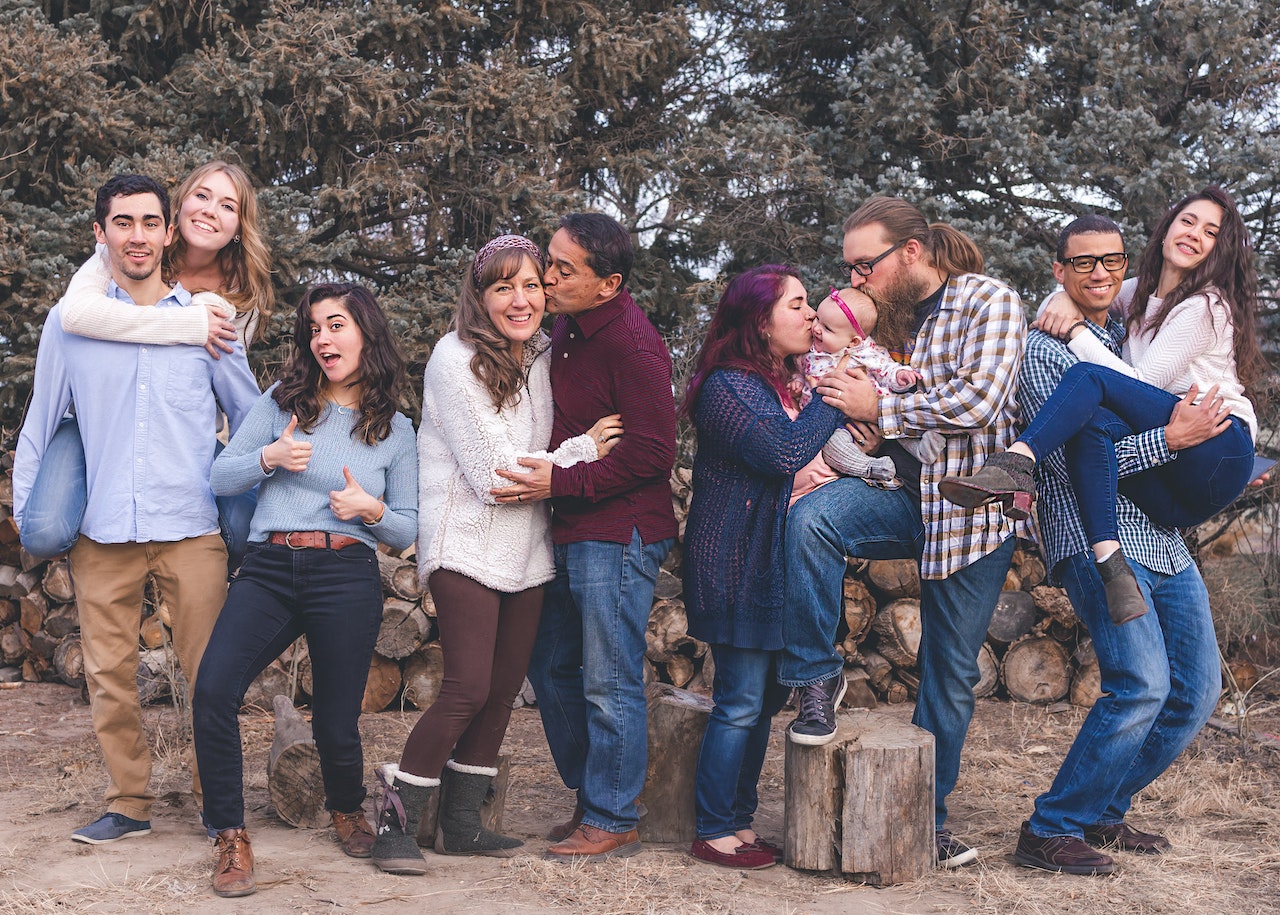
Advantages of a Big Family
Imagine waking up to the sound of giggles and cheerful talks (well, on the good days only).
This is the coziness a family brings to your life by making you feel relevant, loved, and cherished.
But besides the love-filled relations a family usually consists of, here are some often overlooked advantages of big families:
There Is Always Someone To Spend Time With
Cozy family gatherings around the dinner table, late-night talks with your siblings while sharing a bed on road trips – are just some of the priceless moments that can only be experienced when living in a big happy family.
Unlike living alone or with roommates, you always have someone to spend time with and talk to when living in a big happy family.
Even though arguments are bound to happen between siblings or between parents and children, there is always a sense of love and togetherness in a big happy family.
In tough times, family members will rally around each other and offer support, and in good times, everyone can enjoy each other’s company.
There is Built-In Support and Assistance
One of the biggest plus points of big families is the sense of support and community that comes from being surrounded by loved ones.
In a big family, there is always someone to lend a hand with childcare, cooking, errands, or any other need. Members of a large family are also quick to offer emotional support during tough times.
Knowing that you have such a strong network of people to rely on can be a great source of comfort and strength.
Children in Larger Families Learn to Share
In today’s world, it’s not uncommon for children to grow up in small families.
With only one or two siblings, they may never learn the essential life lessons that come from sharing.
However, children who grow up in larger families often have different experiences. From an early age, they learn to share everything from toys to parents’ attention.
As they grow older, they continue to share their space and resources. This can result in some challenges, but it also teaches them important skills like cooperation and negotiation.
Families With More Children Tend to Be Closer-Knit
While it is certainly not true in all cases, families with more children tend to be closer-knit. With more kids comes more noise, messes, and chaos—but also more laughter, love, and memories.
There is always someone to play with in a larger family, whether it’s a game of tag in the backyard or a pillow fight in the living room. And when times are tough, siblings can be a source of comfort and support.
Of course, raising a family is never easy, but it can be especially challenging for parents of large families.
However, they would likely tell you that it is all worth it. After all, there is no greater joy than watching your children grow into happy and caring adults.
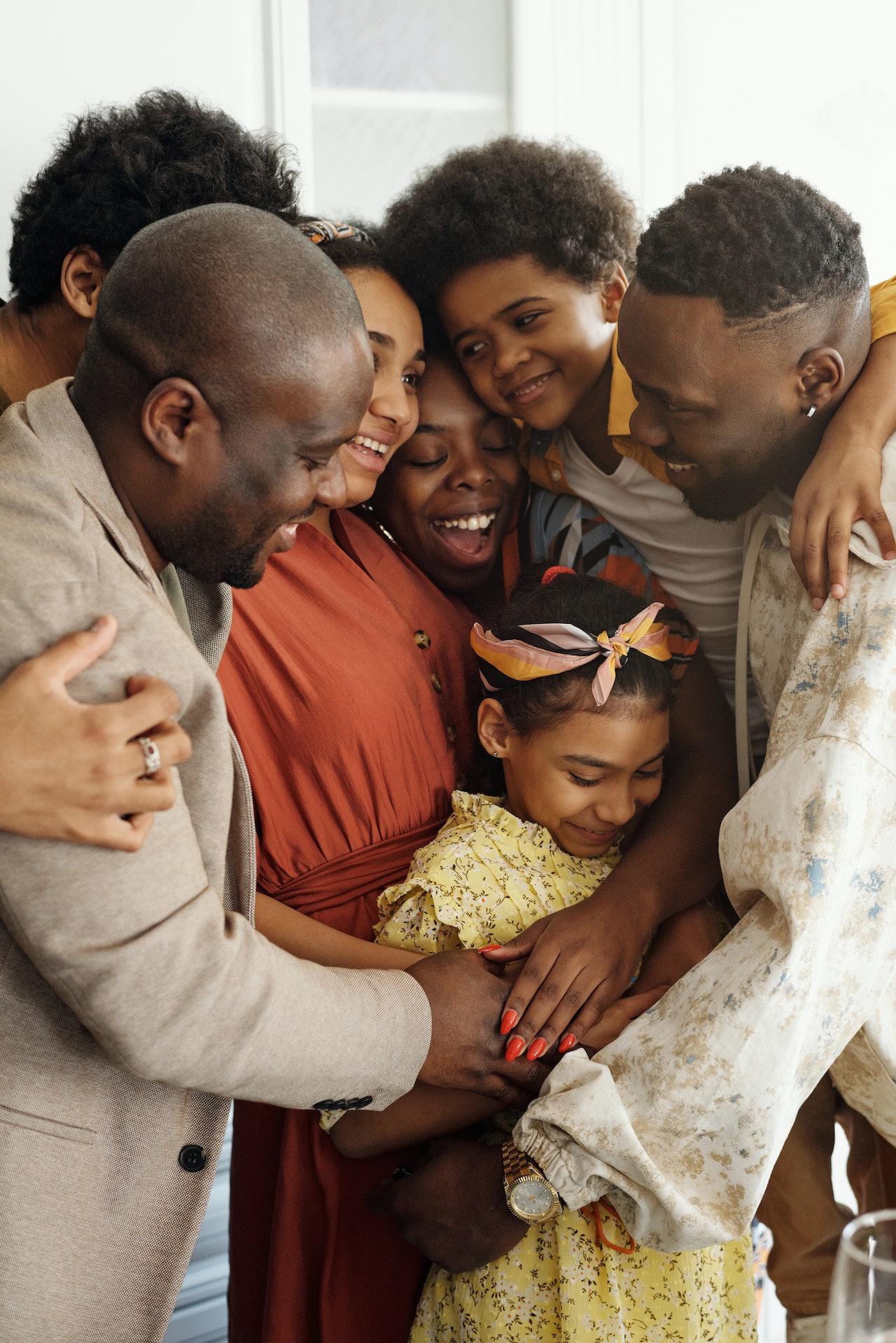
Disadvantages of a Big Family
Sure, big families look great in pictures and their festive times also look fun-filled.
But, it’s not always hunky-dory, especially when there are financial issues and personality clashes.
So, it’s only fair to discuss the major downsides of big families.
Less One-On-One Time For Each Child With Parents
In families with several children, it’s not uncommon for each parent to feel stretched thin.
As a result, each child may have less one-on-one time with their mom or dad. While this can be tough on kids, it’s important to remember that all families are different, and there is no one “right” way to parent.
In fact, research has shown that children in large families often benefit from having a wide social network and developing independent skills at an early age.
Of course, every child is different, and some may thrive with more one-on-one attention. But ultimately, it’s up to each family to find what works best for them.
It’s More Expensive To Support A Large Family
For parents, raising a large family can be both expensive and exhausting.
With more children comes more expenses, from food and clothing to education and child care. And as any parent knows, children require a lot of time and energy.
From dealing with tantrums and homework to soccer practice and field trips, parents of large families often find themselves running on empty.
Of course, there are also many rewards to raising a big family. Seeing all your children grow and succeed is one of the most rewarding experiences a parent can have.
And despite the challenges, most parents of large families wouldn’t have it any other way.
It’s Difficult to Keep Everyone Organized and On Track
Anyone who has ever tried to herd a group of children knows that it can be a challenge to keep everyone organized and on track.
This is especially true for parents of large families. With so many kids to keep track of, it’s easy for things to quickly go off the rails.
From mismatched socks to forgotten homework, there always seems to be something that can trip up even the most well-organized parent.
Big Families Are More Likely To Have Arguments And Disagreements
Any family is likely to experience the occasional argument or disagreement.
However, families with more members may be more prone to conflict due to the greater number of personalities and opinions involved.
In a large family, there are differences of opinion on everything from what to eat for dinner to how to spend a weekend.
And with more people comes more chances for someone to feel left out or excluded.
With so many different personalities in one household, it’s not surprising that arguments and disagreements are more common in large families.
Extended Family
There are many types of large families out there, but one of the most common, yet misunderstood, is an extended family.
Let’s talk about what an extended family is, and the advantages and disadvantages of this type of family unit.
What is an Extended Family
In short, an extended family is a type of family that extends beyond the nuclear family (a nuclear family usually consists of parents, plus the natural children of those parents living together in a household).
An extended family can include grandparents, aunts, uncles, and other relatives. These relatives all live either in one household together, or nearby.
Extended family units are more common in some parts of the world than others.
You are more likely to see them in areas such as Asia, Southern Europe and Africa, and less likely to have them in North America and Northern Europe.
Extended Family Advantages and Disadvantages
Extended families can be complex, with many advantages and disadvantages.
One advantage is financial. It’s economically beneficial to all when families can live under the same roof and share expenses.
Extended families can also help each other out with childcare, chores, cooking and other household tasks.
Also, extended families often share close bonds as well as cultural values, promoting a tight knit family to weather the ups and downs of life with.
One of the big disadvantages of extended family situations is that there is often a lack of independence.
Because family members depend so highly on each other, it can be hard to break away, be independent and forge your own path.
Many believe that the advantages of extended families outweigh the disadvantages.
Life in a big family is usually full of love, laughter, and chaos. There are always people around to give hugs and lend a helping hand.
However, there can also be a lot of noise, arguments, and confusion.
With so many people living under one roof, it’s important to have good communication and organizational skills.
But for those who enjoy being surrounded by loved ones, a big family can be the perfect place to call home.
Thanks for reading all about Big Family: The Advantages and Disadvantages of Big Families!
Are you part of a big family? If so, I’d love to hear your experience. Please let us know in the comments!
Have a great day!
Saturday 13th of May 2023
64, no partner, kids or grandkids. My eldest sibling has that large glowing ball of joy called family. So opposite it hurts.
Big Family: The Advantages and Disadvantages of Big Families – Home Gadget World
Tuesday 10th of May 2022
[…] post Big Family: The Advantages and Disadvantages of Big Families appeared first on Burlap + […]

7 Advantages of a Large Family – Why We Had So Many Kids!
By: Author Jamie
Posted on Last updated: December 10, 2023
Categories Featured , Parenting
Benefits of having a large family
If you’ve found this blog post, chances are you fall into one of two camps. Either you’re trying to decide whether you should continue to grow your family or you already have a large family and are trying to remember the upsides during the chaos. I’ve been in both places and I’m here to tell you, building a large family with my husband is the best thing we’ve ever done. The advantages are immeasurable, but I’ll try my best to express them here.
Related: Small House Living with Kids
Built-In Support System
Growing up as an only child was pretty lonely.
I always knew I wanted to have a lot of kids of my own.
Now as an adult, I realize how important having a support system really is.
When we are sick, it’s my husband and I trying to juggle everything.
Oh how I wish I had siblings to call to help out when we really need it!
Facing life’s challenges becomes more manageable with a built-in support system.
The collective strength of a large family provides emotional and practical support during tough times.
Social Skills
Growing up in a large family exposes individuals to diverse personalities, fostering the development of strong social skills and adaptability.
My kids aren’t surprised at all when someone doesn’t agree with them or when they don’t get their way.
They’re actually really good at navigating fights and disagreements.
There are so many social skills kids practice in large families without even realizing it.
As an adult now that grew up without siblings, I notice how functional my kids are in hard social situations and I give all the credit to growing up with lots of siblings.
Shared Responsibilities
Whether you want to or not, every day you’re part of a team.
My two oldest, ages 8 and 7, help each other to unload the dishwasher.
My 5 year old is our little mother hen and wants to help with the baby every chance she gets.
Household chores are distributed among family members which helps our kids to feel like they’re part of something.
I make a point to tell all of them that I couldn’t have this many kids without their help.
It takes all of us to make our household run smoothly.
Advantages of a Large Family – Mentorship Dynamics
It isn’t just older siblings teaching the younger ones.
Our daughters often give our sons advice about how to handle an argument with a teammate or friend.
They break up arguments between each other.
We homeschool our kids and our older ones often jump in during my lessons with younger ones and try to teach them what clicked for them.
Close Family Bond
Large families foster strong and enduring bonds among siblings, creating a close-knit network that lasts a lifetime.
We all know dysfunctional families that hate each other.
Ultimately it comes down to personalities, but breaking generational dysfunction begins with us.
I truly believe our kids will maintain strong friendships long after my husband and I are gone.
Emotional Security
Some of our kids are more affectionate than others.
My kids each know which sibling to go to for tech support, advice, homeschool help, and just to hang out with when they’re having a bad day.
A large family provides an ample supply of love and affection, creating a nurturing environment that contributes to emotional security and well-being.
Quality time and companionship
Laughter is multiplied in a large family, turning ordinary moments into shared, joyous memories and creating a positive atmosphere at home.
Our new favorite thing to do after spending a few days with my best friend a couple of months ago is to play games.
Every night (and sometimes instead of doing our homeschool lessons for the day) we play games together as a family.
I can only handle so many games of Sleeping Queens or Trash Pandas before I lose my mind.
My kids can always find someone that’s willing to play whatever game they’re craving.
There is literally never a dull moment.

Networking Within the Family
Down the road, your kids will need to rely on community moreso than they do in these young years.
Who among us hasn’t relied on a friendly recommendation for a mechanic, electrician, or real estate agent?
Having a large family creates this extended network of trusted people to lean on in various trades and skill sets.
Preparation for Real-World Social Dynamics
Growing up in a big family serves as a natural training ground for real-world social dynamics, enhancing interpersonal skills from an early age.
This is also a plug for homeschool.
In the real world, we are seldom segregated into groups based on age.
In a family, we all work, live, and play together almost regardless of age.
Sure our kids that are close in age play together more, but they all spend tons of quality time together.
Growing up in a large family gives each of them so many different personalities of all ages to interact, play, and fight with.
They have a robust social environment that prepares them well for the future.
So far, having a large family is the best thing I’ve ever done. I’m constantly nudging my husband when we’re out and about to notice something sweet the kids are doing. Just an hour ago it was my 7 year old son holding my 4 year old daughter’s hand on the way into Costco. These younger years are so busy and stressful and sometimes hard. They’re also incredibly fun and fulfilling and I hate watching them zoom by so fast. If you feel pulled to have a large family, I don’t think you’ll ever regret welcoming more kids into your family.

- Diseases and Injuries
- Family Health
- Weight Management
More Articles
Characteristics of a healthy family relationship, activities that teach kids to love others, psychological effects of sports on children and youth, the benefits of healthy families, difference between teenagers in big cities & in small towns, benefits of growing up in a large family, side effects include, take one for the team, hand-me-downs, siblings for life.
Large families bring benefits for the kids as well as the parents 2 . The art of compromise, the ability to share with one another and self-reliance are among a few of the traits that children from large families possess. Large families are only as loving and cohesive as the parents make them, according to Vivian Diller, Ph.D., a New York City-based psychologist in the "Psychology Today" article, "The Benefits and Disadvantages of Large Versus Small Families. 2 "
There is generally more competition in bigger families as the siblings want their own share of their parents' attention. The ability to get along and love one another at an early age is thought by many moms of multiple children to be a positive side effect of larger families, according to the article, "Family Size in America: Are Large Families Back?" published on the Baby Center website 1 . Since there is always someone to play with, having siblings increases the ability to make friends, show empathy and accept responsibility, says Baby Center.
- There is generally more competition in bigger families as the siblings want their own share of their parents' attention.
- The ability to get along and love one another at an early age is thought by many moms of multiple children to be a positive side effect of larger families, according to the article, "Family Size in America: Are Large Families Back?"
Children from large families often recognize the special place they have within their families. As they learn to work together as a team, the ability to do their share is strengthened, according to the article, "Bigger and Better," by Katherine Schlaerth, an associate professor emeritus at the USC School of Medicine and a practicing physician, published on the Los Angeles Times website 3 . These children realize that being part of a larger family requires everyone to do their share; skipping out on their chores or responsibilities may have a ripple effect and disturb the brood.
- Children from large families often recognize the special place they have within their families.
- As they learn to work together as a team, the ability to do their share is strengthened, according to the article, "Bigger and Better," by Katherine Schlaerth, an associate professor emeritus at the USC School of Medicine and a practicing physician, published on the Los Angeles Times website 3.
Generally, people think that they should have smaller families to keep the costs down. Larger families tend to use less, according to Schlaerth. Utilities such as electricity and heat will not increase in the same manner as your grocery bill. Clothing can be handed down from child to child until it wears out. Larger families may spend less on activities and entertainment by creating their own fun. For example, game night can be divided into teams or a day in the park can consist of sack races or kite-flying contests.
- Generally, people think that they should have smaller families to keep the costs down.
- For example, game night can be divided into teams or a day in the park can consist of sack races or kite-flying contests.
Not every child from a large family is going to have a positive experience or feel that her needs were met. In large families with healthy connections, siblings bond and can become lifelong friends. As adults, they are there to support one another; there is generally a loyalty and trust that remains strong through the ups and downs of life, according to Schlaerth. Siblings will assist each other with everything from caring for their parents in old age to helping each other out with childcare. Extended family events carry the potential to increase those bonds further.
- Not every child from a large family is going to have a positive experience or feel that her needs were met.
- As adults, they are there to support one another; there is generally a loyalty and trust that remains strong through the ups and downs of life, according to Schlaerth.
Related Articles

Omega 3 & Anchovies

Reasons Why People Have Low Coping Skills

Adler's Birth Order Theory

Christening Etiquette for Parents

Physical, Social, Emotional & Intellectual Benefits of Outdoor Recreation
- Baby Center: Family Size in America: Are Large Families Back?
- Psychology Today: The Benefits and Disadvantages of Large Versus Small Families
- Los Angeles Times: Bigger and Better
- Thomas PA, Liu H, Umberson D. Family relationships and well-being. Innov Aging. 2017;1(3):igx025. doi:10.1093/geroni/igx025
- Poutiainen H, Hakulinen-Virtanen T, Laatikainen T. Associations between family characteristics and public health nurses' concerns at children's health examinations. Scand J Caring Sci. 2014;28(2):225-34. doi:10.1111/scs.12035
- Defrain J. Asay S. Strong families around the world. Marriage & Family Review. 41(1-2):1-10. doi:10.1300/J002v41n01_01
Karen Kleinschmidt has been writing since 2007. Her short stories and articles have appeared in "Grandma's Choice," "Treasure Box" and "Simple Joy." She has worked with children with ADHD, sensory issues and behavioral problems, as well as adults with chronic mental illness. Kleinschmidt holds a Bachelor of Arts in psychology from Montclair State University.
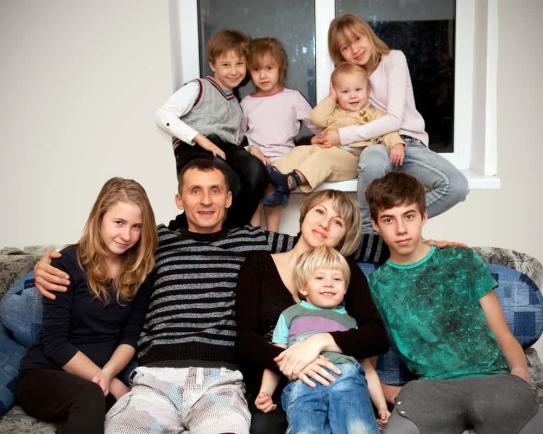
Strolling around New York City with a pack of nine people wearing matching yellow T-shirts may not be something I enjoy reflecting on. But as the youngest of seven, I have many fond memories of growing up in a large family. With birthrates at a record low , many are missing these advantages. Here is a list of some of the positive aspects of growing up in a big family.
1. Learn to share and compromise
A 2004 study of more than 20,000 kindergarteners in America found that teachers rated students who had at least one sibling as having an edge in social skills. They were better at making friends, helping other kids and more in tune to the feelings of others. Compromise and cooperation are just some of the positive results kids can benefit from having multiple siblings. These abilities help children build more positive relationships with one another.
2. Lonely buster
Many parents find that children with multiple siblings tend to get along better and love each other at an earlier age. According to BabyCenter , having more than one sibling increases a child's ability to make friends, show empathy and accept responsibility since there is always someone to play with.
Friends and neighbors may come and go, but siblings are there for life!
3. Bigger vocabulary
An advantage of being one of the youngest in a large family is having a bigger vocabulary. When you spend all your time around older siblings, you tend to use bigger words. However, you may not necessarily know what they mean.
4. Love multiplies for children
When a friend of mine was expecting her second child, she shared with me some worries of not loving him as much as her first child. I assured her that as you have multiple children, the love does just that: multiplies! It's a wonderful feeling to see how much the love you thought was already about to burst, can continue to grow with each new member of the family.
5. Love deepens for husband
I remember the exact moment when I looked at my husband right after I gave birth to our first child. I was physically drained, yes. But what I remember most was how I literally felt my love for him grow at that moment. And it only intensified with each child. Children are quite observant to the loving relationship their parents have, even when no words are spoken. This makes for a healthier family relationship which reflects on the personality and actions of children.
6. Housework help
With a bigger brood often comes a bigger house. No need to fork out extra dough for a cleaning service! Get those kids to work! Chores, especially when organized, teach children responsibility.
7. Names, Names, Names
Remember when you were young, and you would envision your future family and pick out names for each child? With a big family comes a need for a variety of names! Something fun (and maybe a little scary) you could do to involve the older children is to let them pick out the name of the new baby! But proceed with caution: if I had let mine do that, my youngest would be named Spinosaurus.
8. "Team" work
I have many fond memories of playing kick-ball with my siblings. Often, our parents would join in on the fun and we would have two full-sized teams in our backyard. This gives children great opportunities to practice good sportsmanship.
9. Self-reliance
According to educational consultant, James B. Stenson , children from big families are genuinely needed at home. Through their chores and their handling of responsibilities around the house, they contribute to the family's welfare. They grow in self-knowledge, self-confidence and self-reliance.
10. Grow to be givers
Children from big families understand the real meaning of responsibility, as mentioned above. They learn that if they don't do their duty, someone else will suffer. Consequently, their moral development moves from "self" to "others," taking root more deeply. They grow to be givers, not takers.
These are only some of the benefits of growing up in a big family. These life lessons can be learned more naturally and help to create our character. Our families are what make us who we are today.
What One High School Runner Does When an…

- Contributors
- Advertise With Us
- Privacy Policy
- Unsubscribe From Notifications
- Terms of Service
- Do Not Sell My Data
- Radiant Digital
5 Things I loved about growing up in a big family
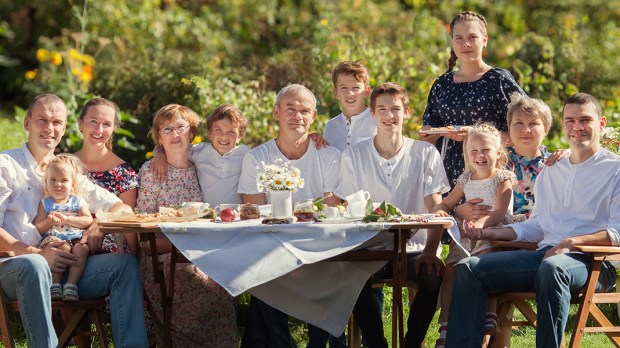
RimDream | Shutterstock
1 The sense of camaraderie
As an adult, coming home for holidays or special events to a large group of people who love and care about you is wonderful. Sharing memories and reminiscing with eight other people makes for a lively, fun time. It can seem overwhelming or strange if it’s not something you’re used to, but a big family is a little like its own small tribe. And it’s such a gift when you’re part of that tribe — when you belong to this unique set of people with its own particular customs and memories. I feel so welcomed, loved, and included when we’re together.
2 There’s always someone to talk to
This changes from childhood to adulthood, but it’s a beautiful thing. As a kid, there was always someone to play with or talk to, and now, as an adult, having siblings to share life with is very comforting. Relationships change and grow, and while navigating that can be tricky (as it is with any relationship), the fruits are worth it. If you didn’t get along with your siblings as children, there’s always the possibility that you will reconnect as adults in a new and deeper way.
3 Sharing and pitching in were normal
To make life with a lot of people work, everyone has to be willing to help out. At some point you realize that bickering and shirking responsibility just prolongs the process, and you learn to get things done as part of a team. That has been invaluable in so many parts of life … Marriage? Check. Problem solving with a team at work? Check. Making a party or event run smoothly? Check. You can’t beat a built-in training system for lifelong teamwork and work ethic skills.
4 Babies were a normal part of life
Babies are amazing. They have a way of unifying people through their utter helplessness and sweetness. It’s strange how someone so small can bring such joy and pride to much larger, more rational creatures. Getting to experience all the firsts of different kinds for siblings was incredible: from those first newborn days home from the hospital, to first steps, and first words. Watching a tiny person grow and learn is fascinating and life-changing. And often, no matter where you fall in the line of a big family, there are babies — if you’re the youngest, the oldest kids may be having kids when you’re still fairly young yourself!
5 My resume for babysitting jobs was impressive
As a middle schooler and high schooler, it was easy to find babysitting jobs because having built-in experience with little kids turns out to instill a lot of confidence in other parents. However, I don’t think I would have had those skills without my family. I’m not naturally great at relating to children, but I was able to develop that skill thanks to my younger siblings.
Growing up there were many things going on at any particular time, and lots of people in any given space. But that made for a vibrant and love-filled childhood. And it’s given me a support system into adulthood that I truly appreciate. I can’t imagine life without each of my siblings. Thanks, Mom and Dad!
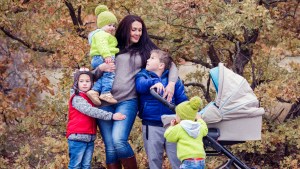
Articles like these are sponsored free for every Catholic through the support of generous readers just like you.
Help us continue to bring the Gospel to people everywhere through uplifting Catholic news, stories, spirituality, and more.

The Benefits and Disadvantages of Large Versus Small Families
'tis the season to be.....thinking about having another baby.
Posted November 30, 2011
According to the CDC, most babies in the United States are conceived during December and January. Is it because couples hunker down for the long winter season? Or is it the holiday celebrations and spiked eggnog that lead to mistletoe munchkins nine months later? Whatever the reason, the statistics remain pretty consistent. More couples begin families -- and add to them -- during this festive time of year.
For me, like millions of others, the holidays now bring a fair amount of preparation for my already existing family. I am a psychologist, wife, mother of three, step-mom to one and grandmother of two. While once focused on the festivities (yes, my brood sprung from that popular generative season), my attention now centers on all that has to get done between Thanksgiving and New Year's -- with relatives visiting, kids coming home, meals to prepare, parties to attend -- and presents to buy! It got me thinking about the differences between holidays shared with small families versus larger ones, a topic I recently discussed with Michael Coren on The Arena.
On the show, Coren brought up the Dugger family -- you know, the one with "19 kids and counting," who just announced that number 20 is on the way? Clearly, every month is a busy one for this couple, but it is particularly hard to imagine what it's like at their house this time of year. And even more unimaginable what it will be like when those children add spouses and offspring to their holiday celebrations. While it's easy to disparage this reality show phenomenon, Coren asked me to talk about the psychological upside to having lots of siblings. He referred to his own positive experiences with his wife's family of fifteen, which made me think of mine, with my husbands many relatives.
You see, it's all relative, about relatives. I just returned from a lovely Thanksgiving dinner hosted by my in-laws, which included about 25 of my extended family members. A warm, lively affair, it felt like a huge extravaganza in comparison to the ones of my childhood . Growing up, holiday dinners in our home were small, intimate gatherings shared only with my parents and two siblings.
When I met my husband, he came along with a three-year-old son from his first marriage and close relationships to his large extended family. They included parents -- a dad, now a robust 99, a mom still graceful at 95 -- a younger brother, a sister-in-law, aunts, uncles, cousins and more cousins. For them, family get-togethers were well choreographed and much anticipated events. Most everyone lived close by (few seem to want to move far from one another), but even those who had to travel wouldn't miss these celebrations.
It took me some time to get used to this fanfare on Thanksgiving, Christmas, Mother's Day, Father's Day, birthdays and so on -- any event was an excuse for a large family gathering. The preparation, the decorating, the bustling, the presents -- oh, and the chaos! Our most recent Turkey Day was just that -- an afternoon of continuous chatter, endless food, wine and non-stop toasts -- a collaborative event from beginning to end. At some point, music went on and everyone began dancing, the evening winding down only as the elders and babies fell asleep. It was so unlike the atmosphere created by my smaller family, who celebrated holidays is a very different way.
My parents were Holocaust survivors, so by the time I was born, only a few of my extended family were around for celebrations. My grandparents, and all but one of my mom and dad's ten siblings had been killed in concentration camps. We had no cousins or second cousins, and only a couple further removed. On holidays, my mom did the cooking (most often brisket and mashed potatoes), the serving and the clean-up. There was kosher wine, candles and usually a blessing that my dad sung before the meal. It was kept simple and the same -- except for the conversation. We talked books, politics , current events and topics that seemed important to us at the time -- plans, dreams , expectations. Sometimes we would talk over each other, but each got a turn. For my parents, every holiday -- or for that matter, everyday -- was cause for quiet commemoration. They had survived and we were their proof.
My parents are gone now and my siblings don't live nearby. So my holidays are most often spent with my husband's large, boisterous family, which I have come to view as a built-in nest. As new children are born, they are happily welcomed. As elders get more frail, responsibility is shared. Between the swapping of stories, jokes and pictures, there is always time for a family member in need of support. Bottom line, they are there for one another -- to depend upon for comfort, to count on for fun.
No doubt, bigger does not necessarily mean better, but large families can teach us important lessons. Whether or not we approve of the Duggers' religious and reproductive beliefs, watching how they work -- or don't -- shows us an exaggerated form of what large families entail. There are the compromises, the necessary patience, and a constant sense that life has to be divvied up. The available resources -- not only financial, but parental affection and attention -- have to be shared.

In a world that seems so unpredictable and unsafe, it's an appealing notion to think the more the merrier. On the other hand, most of us realize that 20 kids is a bit much -- maybe even a little bizarre -- given that many couples are postponing having even one during these tough economic times. Interestingly, when you ask those who grew up in huge families if they plan to recreate that experience for their own children, often they cut the number down by quite a lot. Mostly they say they can't afford it, but they also talk about wanting more quiet time and of course, more sweet potatoes to go around!
In the end, family satisfaction seems to come down to how well parents create a loving atmosphere at home -- and not just during the holidays. You can have a family with one or two kids and experience deprivation and disconnection, or a family of many more and feel as if your cup runneth over. Regardless of size, there is something to say about family gatherings that give us all a chance to celebrate what we have -- big or small.
'Tis the season when more than mice will be stirring all through our houses. So be merry and have fun, but take a moment to ask yourself how you feel about large or small families? It's a choice worth contemplating between drinking eggnog and eating latkes -- one that impacts not only the holidays, but the rest of your life.
What do you believe are the benefits and disadvantages of having a large (or small) family?
Vivian Diller, Ph.D. is a psychologist in private practice in New York City. She has written articles on beauty, aging, media, models and dancers. She serves as a consultant to companies promoting health, beauty and cosmetic products. Face It: What Women Really Feel As Their Looks Change (2010), written with Jill Muir-Sukenick, Ph.D. and edited by Michele Willens, is a psychological guide to help women deal with the emotions brought on by their changing appearances.
For more information, please visit my websites at Face It: The Book and Vivian Diller. Friend me on Facebook or continue the conversation on Twitter.
Follow Vivian Diller, Ph.D. on Twitter: www.twitter.com/DrVDiller

Vivian Diller, Ph.D. , is a psychologist in private practice in New York City and co-author of Face It: What Women Really Feel As Their Looks Change .
- Find a Therapist
- Find a Treatment Center
- Find a Psychiatrist
- Find a Support Group
- Find Teletherapy
- United States
- Brooklyn, NY
- Chicago, IL
- Houston, TX
- Los Angeles, CA
- New York, NY
- Portland, OR
- San Diego, CA
- San Francisco, CA
- Seattle, WA
- Washington, DC
- Asperger's
- Bipolar Disorder
- Chronic Pain
- Eating Disorders
- Passive Aggression
- Personality
- Goal Setting
- Positive Psychology
- Stopping Smoking
- Low Sexual Desire
- Relationships
- Child Development
- Therapy Center NEW
- Diagnosis Dictionary
- Types of Therapy

Understanding what emotional intelligence looks like and the steps needed to improve it could light a path to a more emotionally adept world.
- Coronavirus Disease 2019
- Affective Forecasting
- Neuroscience

COMMENTS
Whatever the definition, a big family typically requires more space, more resources, and more patience than a smaller one. But they also tend to be louder, messier, and more chaotic. There are also more chances for conflict, but also more chances for love and laughter. In many ways, a big family is like a microcosm of the world.
People say that when a family is large, there will be a lots of fights. This may be true. It is normal for children to argue or quarrel with one another.However, it is also normal for the fights to end quickly. Two children may quarrel. The next minute,they may play together.
Growing up in a big family serves as a natural training ground for real-world social dynamics, enhancing interpersonal skills from an early age. This is also a plug for homeschool. In the real world, we are seldom segregated into groups based on age. In a family, we all work, live, and play together almost regardless of age.
The art of compromise, the ability to share with one another and self-reliance are among a few of the traits that children from large families possess. Large families are only as loving and cohesive as the parents make them, according to Vivian Diller, Ph.D., a New York City-based psychologist in the "Psychology Today" article, "The Benefits ...
Here is a list of some of the positive aspects of growing up in a big family. 1. Learn to share and compromise. A 2004 study of more than 20,000 kindergarteners in America found that teachers rated students who had at least one sibling as having an edge in social skills. They were better at making friends, helping other kids and more in tune to ...
2 There’s always someone to talk to. This changes from childhood to adulthood, but it’s a beautiful thing. As a kid, there was always someone to play with or talk to, and now, as an adult ...
Though growing up in a large family has its negatives, I’ve grown to understand that those problematic things have equipped me for the dependability of adulthood. Being a part of a big family can be chaotic at times, financially strenuous and occasionally overwhelming, but there are some awfully great benefits to living in a full house.
The family is a guide for the success of a child's future. The stability of family creates a building block for how the child will progress throughout life. When parents divorce, the children are left with no stability causing them to lose basic concepts of childhood that may carry with them throughout life.
As elders get more frail, responsibility is shared. Between the swapping of stories, jokes and pictures, there is always time for a family member in need of support. Bottom line, they are there ...
Photo via Pinterest. I grew up in the South in the 1950s where it was not unusual for most families to be large ones. My mother had ten children that consisted of eight girls and two boys. The first seven children are girls, and my mother really wanted a boy. The eighth child was a boy. Then she had another girl.